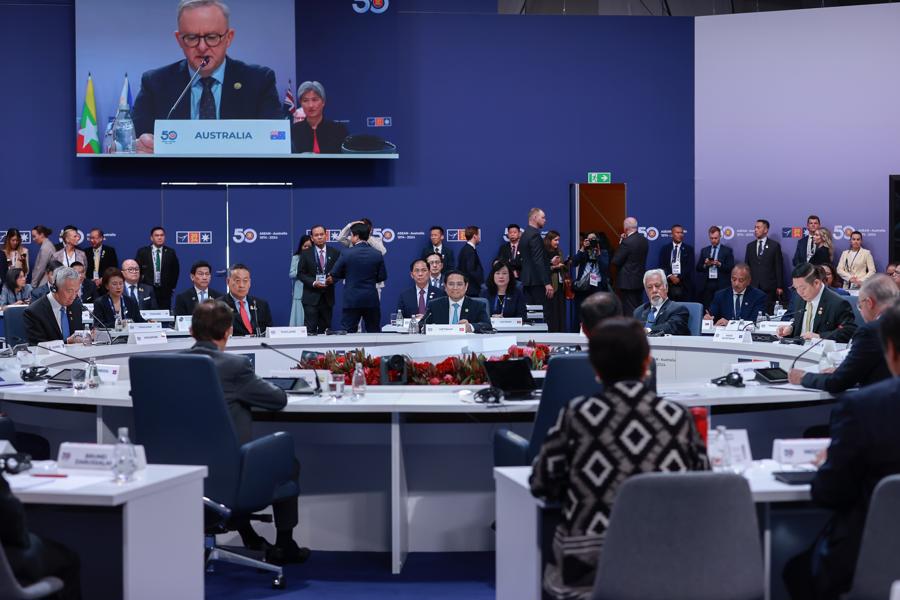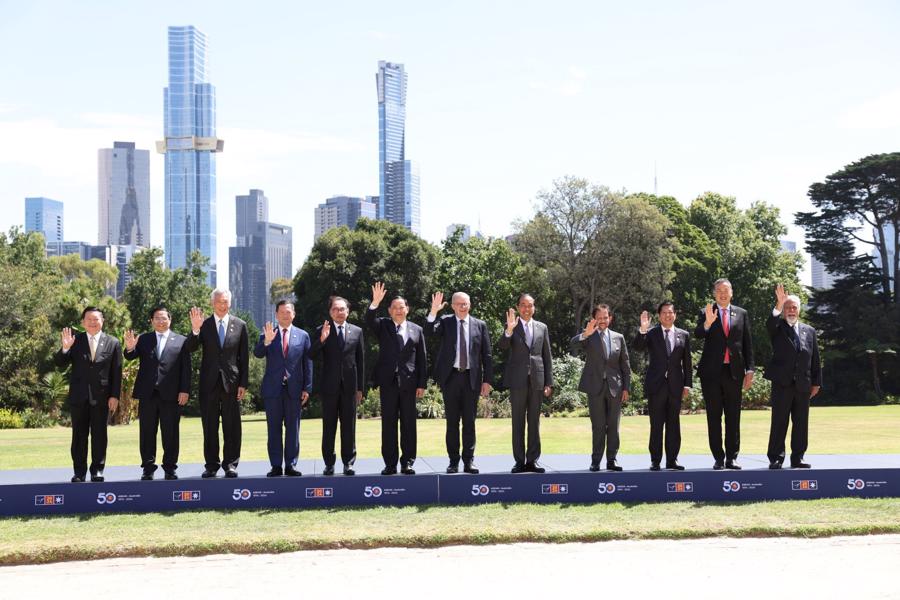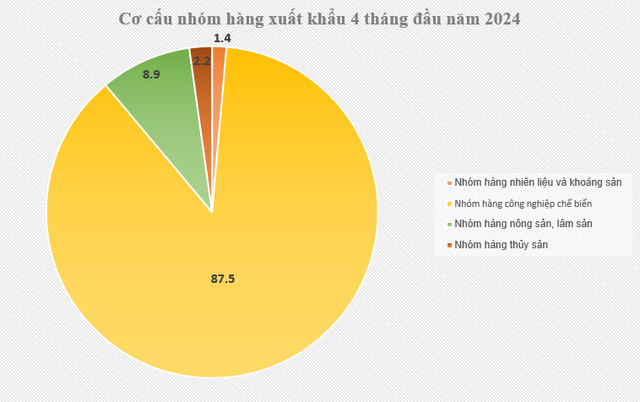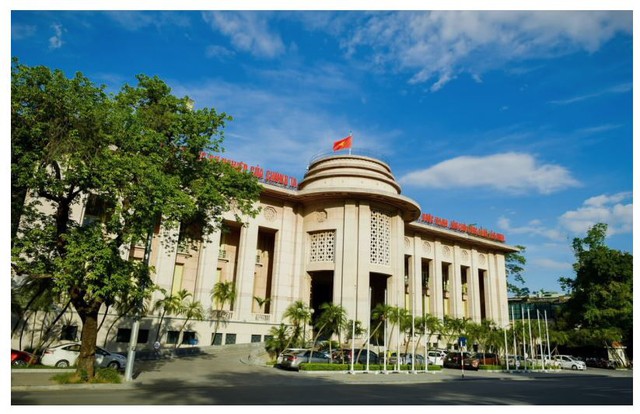This is an opportunity for ASEAN and Australia leaders to look back on their relationship over the past half-century and set a vision and direction for future development.
The leaders of both sides expressed satisfaction with the development of their relationship and cooperation, especially since the establishment of a strategic partnership in 2014 and its upgrade to a comprehensive strategic partnership in 2021. Australia is the first dialogue partner and one of the first to establish a comprehensive strategic partnership with ASEAN.
The bilateral relationship is dynamically developing in all key areas: political-security, economic, socio-cultural, and development cooperation. In 2022, the two-way trade volume reached over USD 101 billion, nearly a 20% increase compared to 2021.
Australian investment in ASEAN reached over USD 2 billion, a 6.5-fold increase compared to 2021, nearly reaching pre-COVID-19 levels. Australia is also one of the leading partners supporting ASEAN in community building, providing scholarships for students from ASEAN countries, and providing financial and technical assistance to enhance connectivity, narrow development gaps, and develop the Mekong sub-region.
In discussing the future development directions, both sides agreed on the need to make strong breakthroughs in economic, trade, and investment cooperation by effectively implementing the upgraded ASEAN-Australia-New Zealand Free Trade Agreement (AANZFTA) and the Regional Comprehensive Economic Partnership (RCEP) Agreement. They also aim to enhance cooperation in new fields such as innovation, digital economy, green and energy transitions, e-commerce, and connectivity, which will serve as new drivers for economic growth.

ASEAN welcomes Australia’s announcement of an additional AUD 222.5 million for cooperation with Mekong sub-regional countries, the establishment of a AUD 2 billion investment fund, and other initiatives to promote trade and investment with ASEAN in the future.
The two sides also agree to enhance political-security cooperation, defense cooperation, maritime cooperation, cybersecurity, particularly within ASEAN-led mechanisms and forums such as the East Asia Summit (EAS), ASEAN Regional Forum (ARF), and ASEAN Defense Ministers’ Meeting Plus (ADMM+), contributing to shaping a regional structure based on the rule of law with ASEAN at the center and implementing cooperation based on ASEAN’s Outlook on the Indo-Pacific (AOIP). They also aim to strengthen educational and cultural cooperation, people-to-people exchanges, especially among youths and young leaders.
Australia also announced an additional AUD 40 million for the Southeast Asia Maritime Partnership Program, increasing the total funding to AUD 64 million for the next 4 years, and providing 55 master’s scholarships and 55 research scholarships under the “Australia for ASEAN Futures” initiative. They will establish the ASEAN-Australia Center to promote cultural and educational exchanges between the two sides.
In assessing the complex global and regional situations, with increasing instability and conflicts in many places including the Russia-Ukraine conflict, Gaza, Red Sea, South China Sea, and the Korean Peninsula, both sides emphasize the need to uphold cultural dialogue and cooperation, build trust, prevent conflicts, and uphold the role of international law and multilateralism in behavior and cooperation in addressing common challenges.
The countries highlight the importance of maintaining peace, stability, security, and safety in the South China Sea; peacefully resolving disputes based on international law, especially the United Nations Convention on the Law of the Sea (UNCLOS 1982); and calling for the full implementation of the Declaration on the Conduct of Parties in the South China Sea (DOC), early construction of an effective, substantive, and legally binding Code of Conduct (COC) in accordance with international law (including UNCLOS 1982), making the South China Sea a peaceful, stable, cooperative, and developed region.
In his remarks at the plenary session, Prime Minister Pham Minh Chinh emphasized the special significance of the Summit, highly appreciating the close and longstanding relationship between ASEAN and Australia and Australia’s cooperation and support for ASEAN over the past 50 years.
The Prime Minister proposed three breakthroughs and three enhancements for ASEAN-Australia relations in the future.
First, a breakthrough in economic, trade, and investment cooperation, striving to double trade volume in the next 10 years.
Second, a breakthrough in the development of human resources, particularly high-quality human resources and labor cooperation.
Third, a breakthrough in science-technology cooperation and innovation, with a focus on digital economy, green transition, circular economy, and emerging sectors such as semiconductor chips and artificial intelligence. The Prime Minister proposed exploring the possibility of negotiating an ASEAN-Australia Digital Economy Agreement.

According to the Prime Minister, both sides need to strengthen political trust and security cooperation, ensure regional peace and security, emphasize cultural dialogue and cooperation, promote trust-building and preventive diplomacy, and encourage responsible contributions from major countries to the region. They should also enhance sub-regional cooperation, narrow development gaps for comprehensive, sustainable, and inclusive development, particularly in strategic infrastructure connectivity projects that promote positive socioeconomic changes in ASEAN’s poorer and slower-developing sub-regions.
In addition, both sides should enhance cultural cooperation and people-to-people exchanges, leveraging the strengths of over 1 million people of ASEAN origin, including over 350,000 Vietnamese in Australia. These efforts will contribute to enhancing understanding, empathy, and solid social foundations, especially among the younger generation of both sides.
At the Closed-Door Session, on the shared vision and resounding resources side and acting together for a peaceful, stable, and sustainably developed Indian Ocean-Pacific Ocean region in the future, the Prime Minister proposed 3 “concerted” efforts between ASEAN and Australia to promote a regional vision with 3 aspects:
First, jointly building a united and self-reliant region capable of coping with shocks and disruptors from both within and outside, and effectively capitalizing on new trends and breakthroughs such as innovation, digital transformation, green transition, circular economy, sharing economy, and artificial intelligence, to accelerate comprehensive, sustainable, inclusive, and all-encompassing growth, leaving no one behind.
Second, jointly promoting a region that respects international law and acts in accordance with international law, where countries abide by the United Nations Charter, international law, respect the rules, norms, and standards of behavior of ASEAN and promote the development of new rules and standards, including a truly substantive and effective COC, contributing to making the South China Sea a region of peace, stability, cooperation, and development.
Third, jointly building and shaping an open, inclusive, and ASEAN-centered regional structure, the core factor that brings together and harmonizes the interests of major countries.
At the end of the Summit, the leaders adopted the “ASEAN-Australia – Partnership for Peace and Prosperity Leaders’ Vision Statement” and the “Melbourne Declaration – Partnership for the Future,” setting out a vision for the future and the direction of development in all areas in the coming period.
On this occasion, Australia is organizing a series of events under four main themes: economic, maritime cooperation, young leadership, and climate change. In these events, Australia reaffirms its commitment to implement the 2040 ASEAN Economic Strategy, especially measures to increase trade and investment, eliminate both tariff and non-tariff barriers, enhance capacity and skills, and increase awareness within the Australian business community of ASEAN’s development opportunities.




































